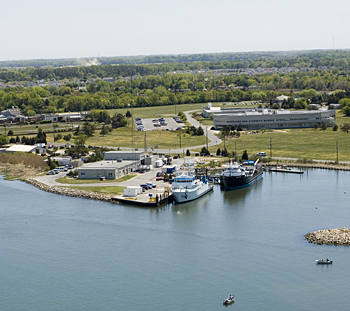Each tour is led by a trained docent volunteer who introduces the public to the research and teaching facilities at UD's College of Marine and Earth Studies. Docents typically guide more than 1,000 visitors through the research laboratories at the Hugh R. Sharp Campus every year. Tour content is suitable for ages 12 and older.
“Many residents and visitors to the area want to learn specifically about our local coastal environment, as well as the global oceans,” Rosalind Troupin, director of the docent program, said. “Our faculty and graduate students are investigating fish and crab populations, wetland invaders, water quality in the Inland Bays and wave action on our beaches.”
Tours typically begin with a 20-minute video highlighting many of the college's research activities. The video transports visitors from the shores of Delaware Bay, where scientists study invasive species, air and water quality, and the status of the horseshoe crab population, to laboratories in Newark, where satellite technology is used to monitor and predict global events such as El Niņo and other related phenomena.
Following the video presentation, docents take visitors on a walking tour of the facilities where the majority of the research in the college's marine biosciences and oceanography programs is conducted. The full tour typically takes approximately 90 minutes to complete, making it ideal for the summer or weekend visitor to Delaware's beaches.
Inside the laboratories, scientists and graduate students conduct research on topics ranging from the ecology of estuarine and coastal fish to the population dynamics of blue crabs to the genetics of marine organisms. The walking tour also includes a visit inside the college's greenhouse, where new uses for marsh plants are being investigated.
Also included are a number of exhibits showing how UD scientists study extreme marine environments such as the frigid, ice-covered seas of the Antarctic and the super-heated hydrothermal vents found more than a mile below the sea surface. Visitors will also learn how scientists are working to address local issues, such as the impacts of land development on Delaware water quality and wildlife.
A favorite stop on the tour is a tropical reef tank, which introduces visitors to one of the most diverse communities on Earth. With the rapid deterioration of coral reefs worldwide, the tank provides a springboard for discussions about the causes of and solutions to this global crisis.
Tours are offered Friday mornings in June. July and August tours are available on Tuesdays and Fridays. Tour groups are limited in size, so reservations are recommended by noon of the preceding day. For complete tour schedules and reservations, call (302) 645-4234.
In addition to these scheduled tours, the college also arranges tours for groups of five or more people over the age of twelve, Monday through Friday, between 10 a.m. and 4 p.m. These may be scheduled by calling (302) 645-4234 at least one week in advance. The Hugh R. Sharp Campus, located at 700 Pilottown Road in Lewes, is accessible to handicapped visitors.
Photo by Kathy Atkinson



